
- 記事一覧
- ゲストライター記事一覧
- Myanmar after Military Coup Part 2(軍事クーデター後のミャンマー②)
Myanmar after Military Coup Part 2(軍事クーデター後のミャンマー②)

We already recognized how military coup of Myanmar atrocious impact society and economy, in part 1 of this article, and we can learn how the military coup has triggered a major surge in both internal and external migration, with significant humanitarian, economic, and political implications both within the country and across the region in this part.
The migration trends in Myanmar have significantly changed after the military coup in February 2021 in the following ways:
1. Internal Migration Disrupted: The conventional pattern of internal migration from rural to urban areas for employment has been disrupted due to the escalating armed conflict across many regions, including the heartland areas. Frequent airstrikes, shelling, and insecurity have forced hundreds of thousands of people to flee their homes and migrate internally to seek safety.(*1)
2. Outmigration Increased: Many people have fled Myanmar to neighboring countries like Thailand to avoid atrocities committed by the military junta. Economic factors like business closures, job losses and lack of opportunities due to the compound impacts of the coup and COVID-19 have driven outmigration. A survey found many migrants are now looking for opportunities in neighboring countries instead of urban centers within Myanmar.(*2)
3. Reverse Migration: The report notes an interesting trend of young and energetic Rakhine migrants returning from abroad to their homeland of Rakhine State to join the armed revolutionary forces against the junta. This reverse migration is driven by the collective Arakan nationalist aspirations instead of personal economic motives.(*3)
The military coup has disrupted traditional internal migration for economic reasons, while driving increased outmigration to flee violence and instability, as well as some reverse migration of diaspora groups joining armed resistance movements against the junta.
The primary destinations for migrants from Myanmar after military coup
1. Thailand hosts the largest number of Myanmar migrants, with an estimated 3 million Myanmar migrant workers in Thailand prior to the coup and most of migrant after the coup are heading to Thailand more illegal ways than legal.(*4)
2. Malaysia is another significant destination for Myanmar migrants, though the numbers are not as high as in Thailand. There are hundreds of thousands of undocumented Myanmar workers in Malaysia in addition to documented ones.
3. Some Myanmar people are also fleeing to other neighboring countries like India and China to escape the violence and instability following the coup. And then the migration to other destinations include Japan, South Korea, and Singapore significantly increase after military coup.
4. Urban centers within Myanmar like Yangon (58% of internal migrants) and Mandalay were the conventional pattern prior to the coup for economic reasons. However, this has been disrupted by the escalating conflict and some areas move for the security concern as conflict.
The primary reason and driver of leaving the country has been security concerns and a desire to escape the military's brutal crackdown, arbitrary arrests, and violence against civilians. And then, economic factors like business closures, job losses, and lack of opportunities due to the combined impacts of the coup and COVID-19 have also pushed many to migrate. The military's announcement of enforcing mandatory conscription for men aged 18-35 and women aged 18-27 has triggered a new wave of panic and desperation among the youth, with thousands queuing in front of embassies to seek visas and some queuing at the border across gate, some leave by illegal Parth and some attempt to suicide because of they don’t want to follow that order.
Therefore, young professionals, students, and also skilled and unskilled workers are trying to leave Myanmar to avoid being conscripted by the military. There are concerns about a "brain drain" as skilled workers and professionals emigrate from Myanmar, depriving the country of valuable human capital and that increased out-migration of skilled labor constrain Myanmar's economic potential and productivity growth. However, under renewed military rule and pandemic-related travel restrictions, many individuals trying to leave Myanmar have encountered bureaucratic delays, state-imposed barriers, and exploitation by unscrupulous brokers. Some aspiring migrants have sought to reach foreign countries through perilous irregular channels, facing risks of trafficking and abuse.
What are the Role of Migrants in resistance Military Coup and How and Why Host Countries should Support Migrants from Myanmar?
Myanmar migrants abroad are playing a vital role in supporting the pro-democracy resistance movement, providing financial support, and connecting the revolution to the outside world. This financial support to resistance movement from migrants and famished of foreign currency by junta force military to impose new Remittances Law in on 1 September 2023. According to that law, the junta has tried to collect income tax from overseas Myanmar workers and pressured them to transfer 25% of their income to domestic banks in Myanmar and that highly problematic law exert control over the flow of foreign currency.
The new law has significantly increased the financial burden and pressure on Myanmar migrant workers abroad, who are already facing heightened economic precarity due to the coup and pandemic. Migrant workers are now compelled to send a quarter of their earnings back to Myanmar, limiting their ability to save or support their families in the country. Some students who had already gone abroad to pursue higher studies joined the Civil Disobedience Movement (CDM) by participating in protests, advocacy efforts, and fundraising for the pro-democracy movement from their host countries. Myanmar government staff and civil servants working or studying overseas resigned from their positions in solidarity with the CDM, cutting off a source of skilled labor for the junta. The diaspora community, including students and migrant workers, became a vital source of funding for the CDM and ethnic armed groups resisting the military withing countries, through remittances and donations.
Supporting the migrants from Myanmar is also one approach of supporting Myanmar citizen in trying to escape from injustice control and in fighting for their freedom and right. Because most of the migrants’ people, but not all, from Myanmar are playing a vital role in supporting the pro-democracy resistance movements in their own ways. Therefore, the host countries, including Japan, should support that migrants from Myanmar through facilitate legal migration pathways by creating or expanding legal migration channels, such as labor migration schemes and student visas, reduction some restrictions and difficulties on applying and extending their visa status, etc. to allow Myanmar nationals to seek safety and economic opportunities abroad and this can help prevent migrants from resorting to dangerous irregular migration routes and others safety concerns. Suspend the deportation of Myanmar nationals and provide temporary protected status or other forms of legal stay to allow them to remain safely, while also contributing to a durable solution to the broader political and humanitarian crisis in the country. Ultimately, host countries should leverage their diplomatic influence to pressure the Myanmar military junta to end the violence, restore democracy, and address the root causes driving people to flee the country.
前回の記事で、ミャンマーの軍事クーデターが社会と経済にどのような影響を及ぼしているかを述べました。この記事では、軍事クーデターが引き起こした移民の急増について述べます。そして、それが人道的、経済的、政治的にどのような影響を及ぼしたかを見てください。
2021年2月の軍事クーデター以降、ミャンマーの移民傾向は以下のように大きく変化した。
1. 国内移住の混乱:雇用を求めて農村部から都市部へ国内移住する従来のパターンは、中核地域を含む多くの地域で武力紛争が激化しているため、妨げられている。頻繁な空爆、砲撃、治安の悪化により、何十万人もの人々が安全を求めて家を追われ、国内での移住を余儀なくしている。
2. 国外流出の増加:軍事政権による残虐行為を避けるため、多くの人々がミャンマーからタイなどの近隣諸国に逃れている。クーデターと新型コロナウイルス感染症の複合的な影響による事業の閉鎖、雇用の喪失、機会の欠如などの経済的要因が人口流出を引き起こしている。調査によると、多くの移民が現在、ミャンマー国内の都市部ではなく近隣諸国に機会を求めていることが判明した。
3. 逆移住:報告書は、若くて精力的なラカイン州移民が、国外から故郷のラカイン州に戻り、軍事政権に対抗するため武装革命軍に参加しているという興味深い傾向を指摘している。この逆移住は、個人の経済的動機ではなく、ラカイン州の少数民族武装勢力「アラカン軍」の願いによって動かされている。
軍事クーデターは、経済的理由によるこれまでの国内移住を混乱させる一方、暴力や不安定さから逃れるための国外流出増加を引き起こした。さらに、軍事政権に対する武装抵抗運動に参加するために、一度は地元を離れたグループの逆移住も引き起こした。
軍事クーデター後のミャンマーからの移民の主な目的地
1. 最も多くのミャンマー移民を受け入れているのはタイだ。クーデター前は推定300万人のミャンマー人出稼ぎ労働者がタイにいた。しかし、クーデター後の移民のほとんどは違法にタイに向かっている。
2. マレーシアもミャンマー移民にとって重要な目的地であるが、その数はタイほど多くはない。マレーシアには、正規のミャンマー人労働者に加え、不法滞在のミャンマー人労働者が数十万人もいる。
3. クーデター後の暴力や不安定な状況から逃れるため、インドや中国などの近隣諸国に避難するミャンマー人もいる。そして軍事クーデター後、日本、韓国、シンガポールなど他の目的地への移住も大幅に増加した。
4. 経済的理由からヤンゴン(国内移民の58%)やマンダレーなどのミャンマー国内の都市部へ移動することは、従来のパターンであった。しかし、これは紛争の激化によって妨げられ、一部の地域では安全保障上の懸念から紛争となっている。
国外退去の主な理由と原動力は、安全保障への懸念と、軍による残忍な弾圧、恣意的逮捕、民間人に対する暴力から逃れたいというものであった。さらに、クーデターと新型コロナウイルス感染症の複合的な影響による事業の閉鎖、雇用の喪失、機会の欠如などの経済的要因も、多くの人を移住に駆り立てている。 18~35歳の男性と18~27歳の女性に強制徴兵を実施するという軍の発表(のちに女性は当面除外を発表)は、若者の間でパニックと絶望の波を引き起こした。数千人がビザを求めて大使館の前に列を作り、ゲートを越えて国境に並ぶ人もいた。違法に国を去る人、その命令に従いたくないため自殺を図る人もいるのが現状だ。
そのため、若い専門家や学生、さらには熟練労働者などが、軍による徴兵を避けるためにミャンマーから出国しようとしている。熟練労働者や専門家が国外に移住することで貴重な人的資本が奪われ、熟練労働者の流出増加がミャンマーの経済的可能性と生産性の伸びを制約する「頭脳流出」が懸念されている。しかし、新たな軍政とパンデミック関連の渡航制限の下、ミャンマーを出国しようとする多くの個人は、官僚的な遅延、国家が課した障壁、悪徳ブローカーによる搾取などに遭遇している。移民希望者の中には、人身売買や虐待の危険にさらされながら、危険なルートで外国に到達しようとする人もいる。
軍事クーデターへの抵抗における移民の役割は?受け入れ国はミャンマーからの移民をどのように支援すべきか?
ミャンマーから海外に出た移民は、民主化のための抵抗運動を支援し、資金を提供し、革命を外の世界に結び付ける上で重要な役割を果たしている。軍事政権は、移民や外貨の飢えからの抵抗運動に対する財政的支援により、2023年9月に新たな送金法を施行するよう強制した。同法によれば、軍事政権は海外のミャンマー人労働者から所得税を徴収しようとしており、彼らに送金するよう圧力をかけている。彼らの収入の25%がミャンマーの国内銀行に支払われており、この非常に問題のある法律が外貨の流れをコントロールしている。
新法は、クーデターとパンデミックによりすでに深刻な経済的不安定に直面している海外のミャンマー出稼ぎ労働者に経済的負担と圧力を大幅に増大させている。出稼ぎ労働者は現在、収入の4分の1をミャンマーに送金することを強いられており、節約したり国内で家族を養ったりする能力が制限されている。すでに高等教育を受けるために海外に渡航していた学生の中には、受け入れ国で抗議活動、擁護活動、民主化運動のための資金調達に参加することで、市民不服従運動(CDM)に加わった者もいた。海外で勤務または留学していたミャンマー政府職員や公務員はCDMに加わって職を辞し、軍事政権への熟練労働力の供給源を断った。学生や移民労働者を含む海外在住のコミュニティは、CDMや国内で軍に抵抗する少数民族武装グループに送金や寄付を行い、グループの重要な資金源となった。
ミャンマーからの移民を支援することは、不当な支配から逃れようとし、自由と権利のために戦うミャンマー国民を支援するアプローチの一つでもある。なぜなら、ミャンマーからの移民のほとんどが、それぞれのやり方で民主化のための抵抗運動を支援する上で重要な役割を果たしているからだ。したがって、日本を含む受け入れ国は、労働移民制度や学生ビザなどの合法的な移民経路の創設や拡大、ビザ資格の申請や延長における制限や困難の軽減など、合法的な移民経路の促進を通じてミャンマーからの移民を支援すべきである。これは、ミャンマー国民が海外で安全と経済的機会を求めることを可能にするものであり、危険な移住ルートに頼ることを防ぐ可能性がある。最終的に、受け入れ国は外交的影響力を活用して、ミャンマー軍事政権に圧力をかけて、暴力を止め、民主主義を回復し、国民を国外に逃亡させる根本原因に対処する必要がある。
(*1)https://www.iseas.edu.sg/articles-commentaries/iseas-perspective/2022-37-migration-in-post-coup-myanmar-a-critical-determinant-in-shaping-the-countrys-future-by-aung-tun/
(*2)https://www.cfr.org/backgrounder/myanmar-history-coup-military-rule-ethnic-conflict-rohingya
(*3)Same as foot note 1
(*4)https://www.aljazeera.com/news/2024/3/10/fears-of-mass-migration-from-myanmar-as-military-plans-to-draft-thousands

Recently Popular最近よく読まれている記事
-

食べていても痩せる 高齢者終末期のカヘキシア(悪液質)
食べていても痩せる。活発に運動を続けている人なら不思議に思わないが、介護度の高い高齢者にそのようなことが果たして起こるのだろうか。起こるのであれば、それはカヘキシアという病態であれば説明できる。 カヘキシア(悪液質)カヘキシアとは、食欲不振・体重減少・全身衰弱・倦怠感などを呈し、生命予後やQOL(qualit… -

終末期の自然な経過を見極めるとは
長期に渡り胃ろうからの栄養を続けていると、注入した物が食道へ逆流したり、唾液や痰の貯留が増えたりして、吸引を繰り返すことになるが、結局のところ、頻回の吸引も間に合わず、心肺停止状態で発見されることが多い。これでは看取りとは言えない。ここに至るまでの言葉を語れない人の苦しみ。このような事態を避ける智慧… -

自閉症スペクトラムと呼ばれているような障害は、実は障害ではない。生物としての人類のバリエーション(変異)の一つである。
自閉症スペクトラムと呼ばれているような障害は、実は障害ではない。生物としての人類のバリエーション(変異)の一つである。本来は人類の、生息環境に対する適応の一つのあり方だというのが、ニューロダイバーシテイ(脳多様性)という考え方に他ならない(詳しくは正高信男著『ニューロダイバーシテイと発達障害』(北大… -

社会保障分野での普遍主義と選別主義について
介護保険や医療保険では、貧富にかかわらず保険によって9割が給付(自己負担は1割)あるいは、7割が給付(自己負担は3割)される。この様な社会保障の方式は、「普遍主義」といわれている。「普遍主義」は、義務教育や、最近では高等学校の授業料にも適応されている(この場合も裕福な人も貧しい人も同様に無償である)。反… -

飲まず食わず(自発的飲食中止)という選択、VSEDをご存知ですか?
前回(Opinionsで9月24日配信記事)は有馬斉氏による安楽死の分類と、我が国の現状についてお伝えしました。また我が国においては、医師の致死的薬剤の処方による積極的安楽死は、法的に支持されていないということもお話ししました。諸外国では医師による致死的薬剤処方による安楽死が認められている国もありますが、もち… -

医療崩壊
ある日の外来。朝の9時から診察室に座りっぱなしでそろそろ3時間が経過。既に再診患だけではなく、その日の新患も回ってきます。で、そうした中に問題のおじさんがいました。「今、○○クリニックで薬をもらっていまして・・・」「30日分貰っているのですが、お腹が痛くなったので、診てもらいに来ました」「○○先生の紹介…
Writer ライター
-
 受賞作品Opinionsエッセイ
受賞作品OpinionsエッセイOpinionsエッセイの記事を見る
-
 ペンネーム東沖 和季
ペンネーム東沖 和季東沖 和季の記事を見る
-
 ニセコ在住下田 伸一
ニセコ在住下田 伸一下田 伸一の記事を見る
-
 ペンネーム 看護師宇梶 正
ペンネーム 看護師宇梶 正宇梶 正の記事を見る
-
 武蔵野大学大学院大谷 航介
武蔵野大学大学院大谷 航介大谷 航介の記事を見る
-
 一般社団法人村楽東 大史
一般社団法人村楽東 大史東 大史の記事を見る
-
 会社員池松 俊哉
会社員池松 俊哉池松 俊哉の記事を見る
-
 (公財)橋本財団研究助成 成果報告
(公財)橋本財団研究助成 成果報告研究助成 成果報告の記事を見る
-
 横浜市立大学小林 天音
横浜市立大学小林 天音小林 天音の記事を見る
-
 東京西徳洲会病院小児医療センター 小児神経科医師秋谷 進
東京西徳洲会病院小児医療センター 小児神経科医師秋谷 進秋谷 進の記事を見る
-
 公益財団法人地方自治総合研究所 常任研究員坂本 誠
公益財団法人地方自治総合研究所 常任研究員坂本 誠坂本 誠の記事を見る
-
 ペンネームAurora
ペンネームAuroraAuroraの記事を見る
-
 つむぐ株式会社 代表取締役竹村 仁量
つむぐ株式会社 代表取締役竹村 仁量竹村 仁量の記事を見る
-
 岡山大学学術研究院医歯薬学域長谷井 嬢
岡山大学学術研究院医歯薬学域長谷井 嬢長谷井 嬢の記事を見る
-
 ソシエタス総合研究所 研究員Karki Shyam Kumar (カルキ シャム クマル)
ソシエタス総合研究所 研究員Karki Shyam Kumar (カルキ シャム クマル)Karki Shyam Kumar (カルキ シャム クマル)の記事を見る
-
 NPO法人妊娠しぇるとSOS 理事長小林 智子
NPO法人妊娠しぇるとSOS 理事長小林 智子小林 智子の記事を見る
-
 書きたい人のためのwebマガジンOpinions編集部
書きたい人のためのwebマガジンOpinions編集部Opinions編集部の記事を見る
-
 介護福祉士渡口 将生
介護福祉士渡口 将生渡口 将生の記事を見る
-
 相談支援専門員・福祉ネイリストゆき
相談支援専門員・福祉ネイリストゆきゆきの記事を見る
-
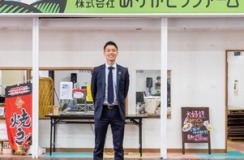 株式会社ありがとうファーム取締役副社長馬場 拓郎
株式会社ありがとうファーム取締役副社長馬場 拓郎馬場 拓郎の記事を見る
-
 ジャーナリスト ペンネームジョワキン
ジャーナリスト ペンネームジョワキンジョワキンの記事を見る
-
 ソシエタス総合研究所 研究員Andi Holik Ramdani(アンディ ホリック ラムダニ)
ソシエタス総合研究所 研究員Andi Holik Ramdani(アンディ ホリック ラムダニ)Andi Holik Ramdani(アンディ ホリック ラムダニ)の記事を見る
-
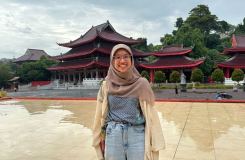 ソシエタス総合研究所 研究員Waode Hanifah Istiqomah(ワオデ ハニファー イスティコマー)
ソシエタス総合研究所 研究員Waode Hanifah Istiqomah(ワオデ ハニファー イスティコマー)Waode Hanifah Istiqomah(ワオデ ハニファー イスティコマー)の記事を見る
-
 元芝園団地自治会岡﨑 広樹
元芝園団地自治会岡﨑 広樹岡﨑 広樹の記事を見る
-
 岡山外語学院留学生カーン エムディ マムン
岡山外語学院留学生カーン エムディ マムンカーン エムディ マムンの記事を見る
-
 行政書士板垣 岳人
行政書士板垣 岳人板垣 岳人の記事を見る
-
 Crimson Education教育コンサルタント蘇 暁辰(Xiaochen Su)
Crimson Education教育コンサルタント蘇 暁辰(Xiaochen Su)蘇 暁辰(Xiaochen Su)の記事を見る
-
 神戸大学准教授斉藤 善久
神戸大学准教授斉藤 善久斉藤 善久の記事を見る
-
 ドイツ在住阿部プッシェル 薫
ドイツ在住阿部プッシェル 薫阿部プッシェル 薫の記事を見る
-
 ライター/編集者黒部 麻子
ライター/編集者黒部 麻子黒部 麻子の記事を見る
-
 翻訳家田尻 潤子
翻訳家田尻 潤子田尻 潤子の記事を見る
-
 アブダビ環境庁長官 Environment Agency – Abu Dhabi (ead.gov.ae)シャイカ・サレム・アル・ダヘリ
アブダビ環境庁長官 Environment Agency – Abu Dhabi (ead.gov.ae)シャイカ・サレム・アル・ダヘリシャイカ・サレム・アル・ダヘリの記事を見る
-
 元整形外科医/農園主散木洞人
元整形外科医/農園主散木洞人散木洞人の記事を見る
-
 豊橋技術科学大学パク ミンジョン
豊橋技術科学大学パク ミンジョンパク ミンジョンの記事を見る
-
 生理革命委員会澤田まりあ、山形萌花、山領珊南
生理革命委員会澤田まりあ、山形萌花、山領珊南澤田まりあ、山形萌花、山領珊南の記事を見る
-
 SOMPOケア株式会社藤田 定司
SOMPOケア株式会社藤田 定司藤田 定司の記事を見る
-
 おかやま山陽高等学校橘 里香サニヤ
おかやま山陽高等学校橘 里香サニヤ橘 里香サニヤの記事を見る
-
 ソシエタス総合研究所 研究員坂入 悦子
ソシエタス総合研究所 研究員坂入 悦子坂入 悦子の記事を見る
-
 Hiro山下行政書士国際法務事務所 代表山下裕司
Hiro山下行政書士国際法務事務所 代表山下裕司山下裕司の記事を見る
-
 ソシエタス総合研究所 研究員Niklas Holzapfel ホルツ アッペル ニクラス
ソシエタス総合研究所 研究員Niklas Holzapfel ホルツ アッペル ニクラスNiklas Holzapfel ホルツ アッペル ニクラスの記事を見る
-
 サウンドエンジニアEmre・Ekici エムレ・エキジ
サウンドエンジニアEmre・Ekici エムレ・エキジEmre・Ekici エムレ・エキジの記事を見る
-
 NPO法人岡山県国際団体協議会
NPO法人岡山県国際団体協議会岡山県国際団体協議会の記事を見る
-
 岡山大学 学術研究院 社会文化科学学域 教授東條 光彦
岡山大学 学術研究院 社会文化科学学域 教授東條 光彦東條 光彦の記事を見る
-
 福岡大学 名誉教授田村 和夫
福岡大学 名誉教授田村 和夫田村 和夫の記事を見る
-
 ソシエタス総合研究所 研究員相川 真穂
ソシエタス総合研究所 研究員相川 真穂相川 真穂の記事を見る
-
 一般社団法人京都総合科学研究所 アドバイザー松村 道郎
一般社団法人京都総合科学研究所 アドバイザー松村 道郎松村 道郎の記事を見る
-
 ワラム株式会社 代表取締役加藤 侑子
ワラム株式会社 代表取締役加藤 侑子加藤 侑子の記事を見る
-
 岡山市立操南中学校 教諭/NPO法人国際協力研究所・岡山代表理事竹島 潤
岡山市立操南中学校 教諭/NPO法人国際協力研究所・岡山代表理事竹島 潤竹島 潤の記事を見る
-
 新西横浜街の予防医療ケア研究室 保健師・看護師・元先端バイオ創薬ベンチャー取締役五十嵐 直敬
新西横浜街の予防医療ケア研究室 保健師・看護師・元先端バイオ創薬ベンチャー取締役五十嵐 直敬五十嵐 直敬の記事を見る
-
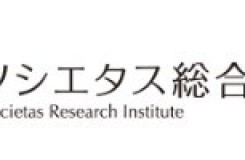 共著橋本俊明・秋吉湖音
共著橋本俊明・秋吉湖音橋本俊明・秋吉湖音の記事を見る
-
 ライター菊池 洋勝
ライター菊池 洋勝菊池 洋勝の記事を見る
-
 大東文化大学国際関係学部・特任教授 高崎経済大学経済学部・非常勤講師 目白大学経営学部経営学科&目白大学大学院経営学研究科 非常勤講師 長崎県佐世保市役所 経済活性化~産業振興に関するアドバイザー、博士(経済学)江崎 康弘
大東文化大学国際関係学部・特任教授 高崎経済大学経済学部・非常勤講師 目白大学経営学部経営学科&目白大学大学院経営学研究科 非常勤講師 長崎県佐世保市役所 経済活性化~産業振興に関するアドバイザー、博士(経済学)江崎 康弘江崎 康弘の記事を見る
-
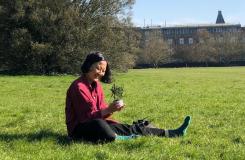 ソシエタス総合研究所 研究員秋吉 湖音
ソシエタス総合研究所 研究員秋吉 湖音秋吉 湖音の記事を見る
-
 JICA専門家足立 伸也
JICA専門家足立 伸也足立 伸也の記事を見る
-
 富士通株式会社 第三ファイナンス事業本部 シニアマネージャー安留 義孝
富士通株式会社 第三ファイナンス事業本部 シニアマネージャー安留 義孝安留 義孝の記事を見る
-
 EDAS(イーダス)理事長田村 拓
EDAS(イーダス)理事長田村 拓田村 拓の記事を見る
-
 監督・プロデューサー湯浅 典子
監督・プロデューサー湯浅 典子湯浅 典子の記事を見る
-
 日本経済大学 准教授山下 誠矢
日本経済大学 准教授山下 誠矢山下 誠矢の記事を見る
-
 人と医療の研究室 代表池尻 達紀
人と医療の研究室 代表池尻 達紀池尻 達紀の記事を見る
-
 一般社団法人飛島学園 代表理事堂野 博之
一般社団法人飛島学園 代表理事堂野 博之堂野 博之の記事を見る
-
 ニッセイ基礎研究所 生活研究部 主任研究員、ヘルスケアリサーチセンター・ジェロントロジー推進室兼任金 明中
ニッセイ基礎研究所 生活研究部 主任研究員、ヘルスケアリサーチセンター・ジェロントロジー推進室兼任金 明中金 明中の記事を見る
-
 医療法人財団足立病院 理事長、社会福祉法人あだち福祉会 理事長畑山 博
医療法人財団足立病院 理事長、社会福祉法人あだち福祉会 理事長畑山 博畑山 博の記事を見る
-
 教育研究家、合同会社ライフ&ワーク代表妹尾 昌俊
教育研究家、合同会社ライフ&ワーク代表妹尾 昌俊妹尾 昌俊の記事を見る
-
 ハーバード大学ベス・イスラエル・ディーコネス・メディカルセンター、高度消化管/最小侵襲外科フェロー中元 啓太郎
ハーバード大学ベス・イスラエル・ディーコネス・メディカルセンター、高度消化管/最小侵襲外科フェロー中元 啓太郎中元 啓太郎の記事を見る
-
 ソシエタス総合研究所 主任研究員井上 登紀子
ソシエタス総合研究所 主任研究員井上 登紀子井上 登紀子の記事を見る
-
 ソシエタス総合研究所 研究員松田 郁乃
ソシエタス総合研究所 研究員松田 郁乃松田 郁乃の記事を見る
-
 ソシエタス総合研究所 研究員アイシェ・ウルグン・ソゼン Ayse Ilgin Sozen
ソシエタス総合研究所 研究員アイシェ・ウルグン・ソゼン Ayse Ilgin Sozenアイシェ・ウルグン・ソゼン Ayse Ilgin Sozenの記事を見る
-
 NPO法人岡山市子どもセンター 事務局久川 春菜
NPO法人岡山市子どもセンター 事務局久川 春菜久川 春菜の記事を見る
-
 ユースワーカー(Youth Woker)森分 志学
ユースワーカー(Youth Woker)森分 志学森分 志学の記事を見る
-
 ペンネーム三村 喜久雄
ペンネーム三村 喜久雄三村 喜久雄の記事を見る
-
 ペンネーム黒木 洋一郎
ペンネーム黒木 洋一郎黒木 洋一郎の記事を見る
-
 NPO法人チャリティーサンタ 理事河津 泉
NPO法人チャリティーサンタ 理事河津 泉河津 泉の記事を見る
-
 金沢大学人間社会学域地域創造学類・准教授 、特定非営利活動法人国土利用再編研究所・理事長林 直樹
金沢大学人間社会学域地域創造学類・准教授 、特定非営利活動法人国土利用再編研究所・理事長林 直樹林 直樹の記事を見る
-
 認定NPO法人ペアレント・サポートすてっぷ理事長安藤希代子
認定NPO法人ペアレント・サポートすてっぷ理事長安藤希代子安藤希代子の記事を見る
-
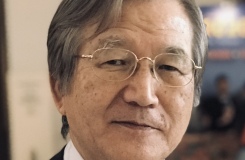 カリフォルニア大学サンフランシスコ校小児胸部心臓外科教授佐野俊二
カリフォルニア大学サンフランシスコ校小児胸部心臓外科教授佐野俊二佐野俊二の記事を見る
-
 社会福祉法人 旭川荘 ひらたえがお保育園 園長江田 加代子
社会福祉法人 旭川荘 ひらたえがお保育園 園長江田 加代子江田 加代子の記事を見る
-
 NPO法人 おかやまUFE 副理事長 ・NPO法人 おかやまUFE 事務局阪井 ひとみ・永松千恵
NPO法人 おかやまUFE 副理事長 ・NPO法人 おかやまUFE 事務局阪井 ひとみ・永松千恵阪井 ひとみ・永松千恵 の記事を見る
-
 社会学者 東京大学名誉教授 認定NPO法人ウィメンズアクションネットワーク(WAN)理事長 上野 千鶴子
社会学者 東京大学名誉教授 認定NPO法人ウィメンズアクションネットワーク(WAN)理事長 上野 千鶴子上野 千鶴子 の記事を見る
-
 外務省 国際保健政策室長 鷲見 学
外務省 国際保健政策室長 鷲見 学鷲見 学の記事を見る
-
 プロ・アダプティブ・サーファー藤原(旧姓:川上)智貴
プロ・アダプティブ・サーファー藤原(旧姓:川上)智貴藤原(旧姓:川上)智貴の記事を見る
-
 京都大学霊長類研究所 教授正高信男
京都大学霊長類研究所 教授正高信男正高信男の記事を見る
-
 社会医療法人石川記念会HITO病院緩和ケア内科統括部長大坂巌
社会医療法人石川記念会HITO病院緩和ケア内科統括部長大坂巌大坂巌の記事を見る
-
 東京医療学院大学保健医療学部教授上田 諭
東京医療学院大学保健医療学部教授上田 諭上田 諭の記事を見る
-
 「夢を叶える145」ライター宮村孝博
「夢を叶える145」ライター宮村孝博宮村孝博の記事を見る
-
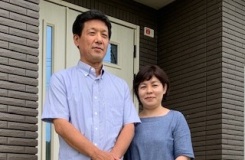 NPO法人 Anneの家 代表 美作地区里親会会員松本芳也・淳子夫妻
NPO法人 Anneの家 代表 美作地区里親会会員松本芳也・淳子夫妻松本芳也・淳子夫妻の記事を見る
-
 特定非営利活動法人あかね 代表理事中山 遼
特定非営利活動法人あかね 代表理事中山 遼中山 遼の記事を見る
-
 大阪市立総合医療センター 緩和医療科部長 兼 緩和ケアセンター長 大阪市立大学医学部臨床准教授 一般社団法人「こどものホスピスプロジェクト」常務理事 日本小児科学会専門医 英国カーディフ大学緩和ケア認定医(Certificate in Palliative Care) 日本緩和医療学会暫定多田羅竜平
大阪市立総合医療センター 緩和医療科部長 兼 緩和ケアセンター長 大阪市立大学医学部臨床准教授 一般社団法人「こどものホスピスプロジェクト」常務理事 日本小児科学会専門医 英国カーディフ大学緩和ケア認定医(Certificate in Palliative Care) 日本緩和医療学会暫定多田羅竜平多田羅竜平の記事を見る
-
 NPO法人 岡山マインド「こころ」/代表理事 一般社団法人お互いさま・まびラボ/副代表理事多田伸志
NPO法人 岡山マインド「こころ」/代表理事 一般社団法人お互いさま・まびラボ/副代表理事多田伸志多田伸志の記事を見る
-
 一般社団法人MY TREE代表理事 MY TREEペアレンツ・プログラムスーパーバイザー 認定フェミニストカウンセラー (公認心理師)中川和子
一般社団法人MY TREE代表理事 MY TREEペアレンツ・プログラムスーパーバイザー 認定フェミニストカウンセラー (公認心理師)中川和子中川和子の記事を見る
-
 兵庫県立ひょうごこころの医療センター精神科医師小田 陽彦
兵庫県立ひょうごこころの医療センター精神科医師小田 陽彦小田 陽彦の記事を見る
-
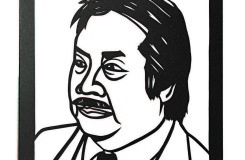 独立行政法人国立病院機構福山医療センター院長岩垣博己・堀井城一朗・矢野 平
独立行政法人国立病院機構福山医療センター院長岩垣博己・堀井城一朗・矢野 平岩垣博己・堀井城一朗・矢野 平の記事を見る
-
 岡山大学 教授 文学部長田中 共子
岡山大学 教授 文学部長田中 共子田中 共子の記事を見る
-
 Civil Engineer (仕組みつくりの技術者)石田篤史
Civil Engineer (仕組みつくりの技術者)石田篤史石田篤史の記事を見る
-
 一般財団法人キヤノングローバル戦略研究所 研究主幹・経済学博士松山幸弘
一般財団法人キヤノングローバル戦略研究所 研究主幹・経済学博士松山幸弘松山幸弘の記事を見る
-
 岡山大学生殖補助医療技術教育研究センター ART教育研究部門長・教授舟橋 弘晃
岡山大学生殖補助医療技術教育研究センター ART教育研究部門長・教授舟橋 弘晃舟橋 弘晃の記事を見る
-
 医療法人サンズ理事長浅野 直
医療法人サンズ理事長浅野 直浅野 直の記事を見る
-
 株式会社ヘリオス 代表執行役社長CEO鍵本忠尚
株式会社ヘリオス 代表執行役社長CEO鍵本忠尚鍵本忠尚の記事を見る
-
 慶應義塾大学文学部人間科学専攻教授(医療人類学) McGill大学人類学部・医療社会研究学部Ph.D.北中淳子
慶應義塾大学文学部人間科学専攻教授(医療人類学) McGill大学人類学部・医療社会研究学部Ph.D.北中淳子北中淳子の記事を見る
-
 岡山大学病院 緩和支持医療科片山英樹
岡山大学病院 緩和支持医療科片山英樹片山英樹の記事を見る
-
 岡山市役所 保健福祉企画総務課松岡克朗
岡山市役所 保健福祉企画総務課松岡克朗松岡克朗の記事を見る
-
 近現代史研究家青木康嘉
近現代史研究家青木康嘉青木康嘉の記事を見る
-
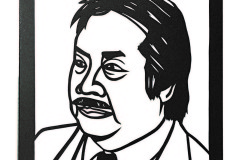 独立行政法人国立病院機構福山医療センター院長岩垣博己・長谷川利路・中島正勝
独立行政法人国立病院機構福山医療センター院長岩垣博己・長谷川利路・中島正勝岩垣博己・長谷川利路・中島正勝の記事を見る
-
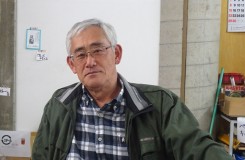 岡山高等学院 副校長 水野文一郎
岡山高等学院 副校長 水野文一郎水野文一郎の記事を見る
-
 社会の仕組み屋、社会の編集者石原 達也
社会の仕組み屋、社会の編集者石原 達也石原 達也の記事を見る
-
 一般社団法人SGSG理事長/中国学園大学子ども学部講師野村泰介
一般社団法人SGSG理事長/中国学園大学子ども学部講師野村泰介野村泰介の記事を見る
-
 一橋大学経済研究所 教授神林 龍
一橋大学経済研究所 教授神林 龍神林 龍の記事を見る
-
 特定医療法人自由会 理事 (社会福祉法人敬友会 理事、公益財団法人橋本財団 理事)橋本 健二
特定医療法人自由会 理事 (社会福祉法人敬友会 理事、公益財団法人橋本財団 理事)橋本 健二橋本 健二の記事を見る
-
 医療法人社団 岡山二人クリニック 理事長、医学博士林 伸旨
医療法人社団 岡山二人クリニック 理事長、医学博士林 伸旨林 伸旨の記事を見る
-
 フリーライター渡辺嗣郎(わたなべ しろう)
フリーライター渡辺嗣郎(わたなべ しろう)渡辺嗣郎(わたなべ しろう)の記事を見る
-
 国立大学法人岡山大学 副理事(国際担当)横井 篤文
国立大学法人岡山大学 副理事(国際担当)横井 篤文横井 篤文の記事を見る
-
 ペンネームドクターX
ペンネームドクターXドクターXの記事を見る
-
 NPO法人 山村エンタープライズ 代表理事藤井裕也
NPO法人 山村エンタープライズ 代表理事藤井裕也藤井裕也の記事を見る
-
 キャンサー・ソリューションズ株式会社 代表取締役社長桜井 なおみ
キャンサー・ソリューションズ株式会社 代表取締役社長桜井 なおみ桜井 なおみの記事を見る
-
 AMDA(アムダ) グループ代表・認定非営利活動法人AMDA 理事長菅波 茂
AMDA(アムダ) グループ代表・認定非営利活動法人AMDA 理事長菅波 茂菅波 茂の記事を見る
-
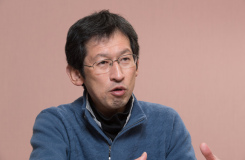 ふれあい歯科ごとう代表五島 朋幸
ふれあい歯科ごとう代表五島 朋幸五島 朋幸の記事を見る
-
 介護従事者髙田 浩一
介護従事者髙田 浩一髙田 浩一の記事を見る
-
 ケアマネ-ジャー・社会福祉士かえる ちから
ケアマネ-ジャー・社会福祉士かえる ちからかえる ちからの記事を見る
-
 五常・アンド・カンパニー株式会社 代表取締役社長慎 泰俊
五常・アンド・カンパニー株式会社 代表取締役社長慎 泰俊慎 泰俊の記事を見る
-
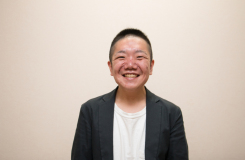 NPO法人 ポケットサポート代表理事三好 祐也
NPO法人 ポケットサポート代表理事三好 祐也三好 祐也の記事を見る
-
 医療法人 寺田病院 院長板野 聡
医療法人 寺田病院 院長板野 聡板野 聡の記事を見る
-
 鳥取市立病院 地域医療総合支援センター 生活支援室 副室長、リハビリテーション部 副部長、歯科 医長目黒 道生
鳥取市立病院 地域医療総合支援センター 生活支援室 副室長、リハビリテーション部 副部長、歯科 医長目黒 道生目黒 道生の記事を見る
-
 鳥取市立病院地域医療総合支援センター長 鳥取市福祉部参与足立 誠司
鳥取市立病院地域医療総合支援センター長 鳥取市福祉部参与足立 誠司足立 誠司の記事を見る
-
 ペンネーム池井戸 高志
ペンネーム池井戸 高志池井戸 高志の記事を見る
-
 ペンネーム池田 出水
ペンネーム池田 出水池田 出水の記事を見る
-
 岡山大学大学院ヘルスシステム統合科学研究科教授松岡 順治
岡山大学大学院ヘルスシステム統合科学研究科教授松岡 順治松岡 順治の記事を見る
-
 鳥取市立病院 名誉院長田中 紀章
鳥取市立病院 名誉院長田中 紀章田中 紀章の記事を見る
-
 岡山大学大学院保健学研究科 副研究科長 教授齋藤 信也
岡山大学大学院保健学研究科 副研究科長 教授齋藤 信也齋藤 信也の記事を見る
-
 公益財団法人橋本財団 理事長、医学博士橋本 俊明
公益財団法人橋本財団 理事長、医学博士橋本 俊明橋本 俊明の記事を見る








